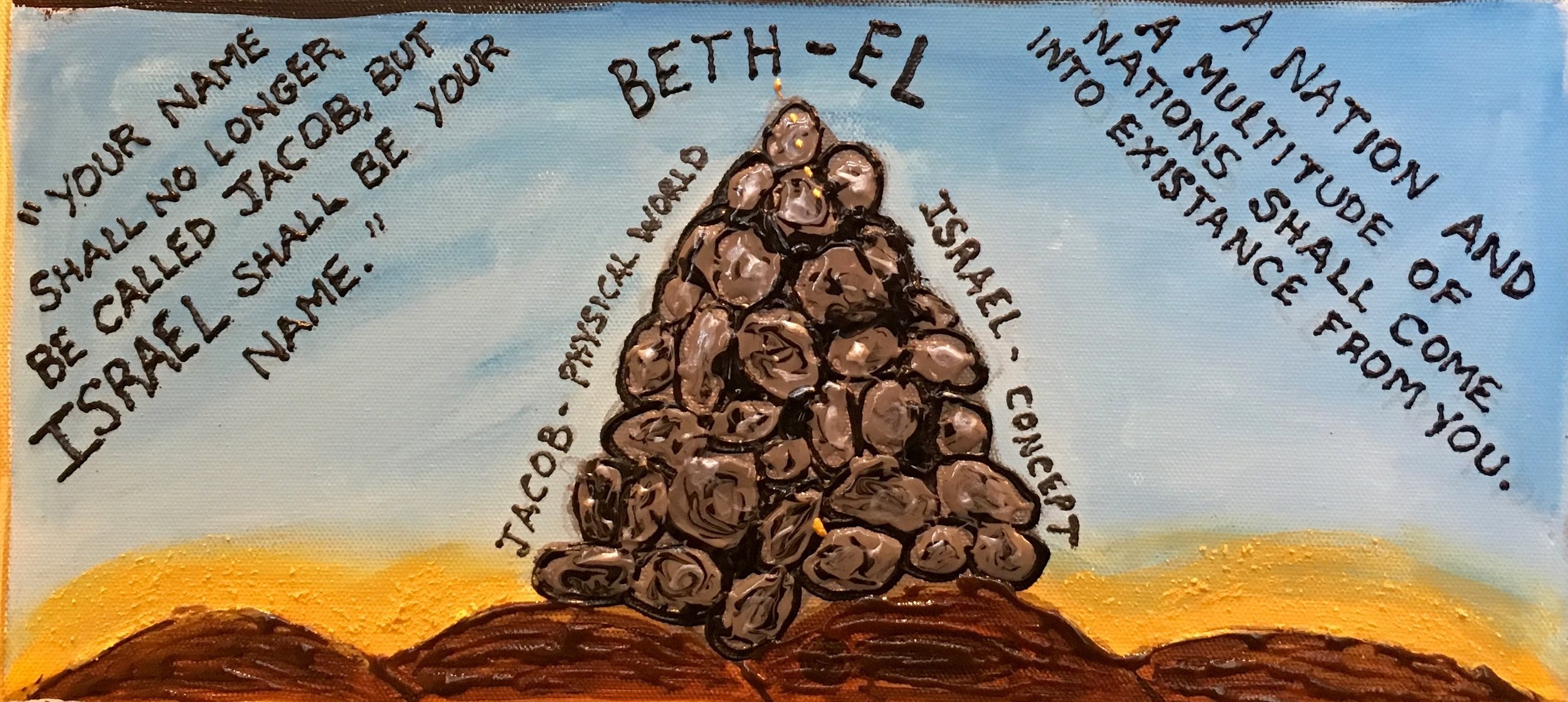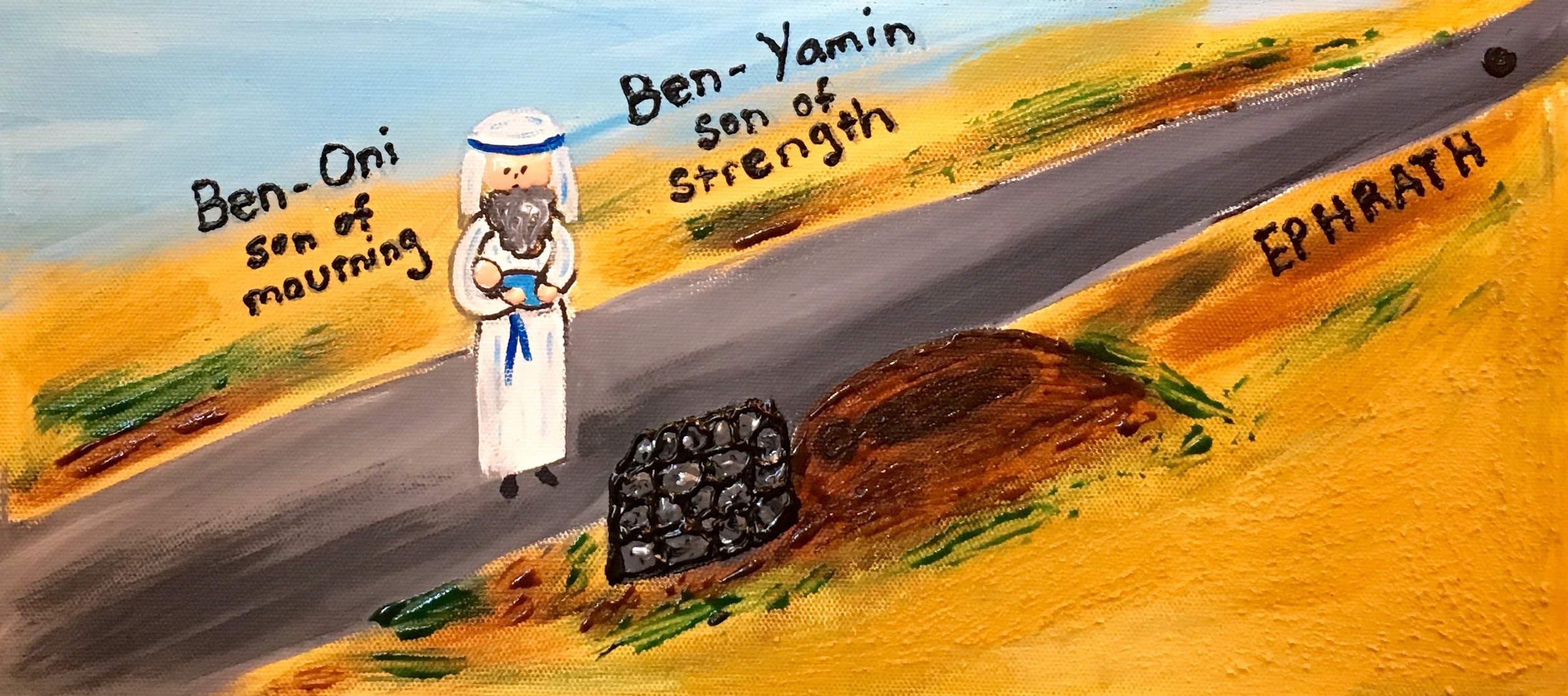Torah Study Date
Saturday, February 19, 2022
Verses Covered
Bereishit (Genesis) 35:1-35:12
Next Session
Saturday, February 26, 2022
Starting at Genesis 35:13
Last week we discussed God telling Jacob to go up to Bethel, live there, and build an altar to God. We discussed the significance of building an altar and wondered whether we have anything like altars today. We talked about putting up a mezuzah on a house as similar and we discussed some Renewal Jews who put up an altar and brought things of importance to them to it. We discussed the text saying the altar was to “God who appeared to you when you were fleeing from Esau” and remembered that Bethel was where Jacob, after fleeing Esau, slept with his head on a stone and dreamed of angels going up and down on a ladder at Genesis 28:11 (and that previously Abram had built an altar to God at the terebinth of Moreh at Shechem and, after that, pitched his tent in the hill country east of Bethel—Genesis12:8).
We discussed Jacob telling his house and everyone who was with him to put away foreign gods that were among them, be purified, and change their clothes. We discussed the foreign gods and where they came from and thought they were the spoils of the attack on Shechem and wondered about the idea from some commentators that it was the women who had the foreign gods. We discussed the idea that Jacob was purifying the people of foreign or idolatrous elements and thought about the pros and cons of that. We discussed what purifying might be. Was it washing? Was it a special purification ceremony through washing (as Jews today say a blessing over hand-washing)? Was it foot washing (which we discussed at length)? Was it the changing of clothes (which we discussed in relation to socks)? We discussed Jacob describing YHVH as “the God who answered me when I was in distress and who has been with me wherever I have gone,” noting that God appears frequently to Jacob even though Jacob is not an entirely appealing character.
We discussed Jacob burying all the alien gods and also the gold earrings under the terebinth near Shechem (this writer wonders whether it could be the place where Abram built his altar mentioned above) and were impressed that he buries them rather than melting them down suggesting he really does not want the people to have anything to do with them—perhaps because of his concern about idolatry or perhaps because he was so unhappy about the attack on Shechem. We discussed a terror from God on the surrounding cities keeping them from pursuing the sons of Jacob (who, after all, had just attacked and pillaged some of them). We discussed Jacob and all his people then getting to Bethel (also called Luz), Jacob building an altar to God as he had been told to do, and naming the place El of Bethel because, as he had been told, God had appeared to him there when he was fleeing his brother.
We discussed Rebecca’s nurse, Deborah, dying and being buried under the oak—the Oak of Weeping–below Bethel and wondered how she happened to be in Jacob’s household recalling that she presumably had been selected by Rebecca’s mother to go with her and give her some comfort when she left her home to marry Isaac, that she was a wet-nurse who nursed Rebecca’s children, that we really do not know what she had been doing or how she got to Jacob’s household but might have gone there to tell Jacob that it was safe for him to leave Laban’s house and go home.
We then discussed God telling Jacob he would no longer be called Jacob but Israel, revealing himself as El Shaddai and telling Jacob he would be fertile and increase and that kings would come from him. We discussed the meaning of “El Shaddai” (God of the mountains? God of breasts, meaning a reference to fruitfulness or fertility? Or do we really know?) and noted that Isaac—when he gave his blessing to Jacob–had called God by that name and hoped God would make him fertile and numerous.
Believe it or not, we discussed a lot more than this—but this sums it up.
Our artwork this week is once again from Jewish painter, Sheila Nemtin from Montreal, Canada, Beth El (above), and Ben-Oni and Ben-Yamin (below) (details from Vayishlach). On her interpretation, each involves a double: Jacob representing the physical world/Israel representing concept and Benoni representing mourning/Benjamin representing suffering.


